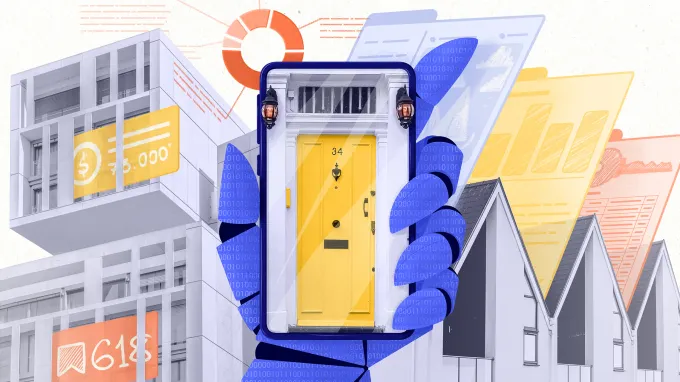AI solutions
What we do
Services
Experts in
How we work
Over the last several years, real estate companies have been actively adopting new technologies, and this tendency is only accelerating. According to the JLL Real Estate Technology Survey 2023, over 80% of surveyed companies plan to increase their technology investments in the next three years. Many are turning to digital transformation services to help modernize their operations, implement scalable solutions, and stay ahead of the competition.
Why is digital transformation a priority for real estate players?
Increased digital expectations from customers, economic challenges, and sustainability threats are among the main drivers of real estate digital transformation. Technologies have already proven to be an effective way to overcome these challenges, create new value, speed up business growth, and maintain a competitive edge.
Transforming business operations with technologies is now a necessity. But it can be challenging.
How should you approach digital transformation?
What technologies can you implement?
What challenges should you be aware of?
In this article, we cover these and many other questions to give you a better understanding of the value digital transformation brings to the real estate industry and how you can scale your business with modern technologies.
Digital transformation has become a buzzword in recent years, but people frequently don’t understand its true meaning. Generally, digital transformation refers to adopting technologies across various areas of an organization.
But what’s the point of adopting technologies?
Rodney Zemmel, a global leader of McKinsey Digital, provided a great answer to this question in an interview:
The point of digital transformation isn’t to become digital. It’s actually to generate value for the business.
With ever-evolving market conditions and the new challenges they bring, finding new ways to stay relevant and competitive and bring new value through products and services is one of the main tasks for any business, including real estate companies.
Real estate digital transformation didn’t start yesterday. This process is dynamic and ongoing. We’ve already seen several waves of technological innovations in the real estate industry, and now we’re at a new stage of digital transformation.
What factors are driving the latest changes in real estate?
Let’s look at the main ones.
The purpose of using any technology in business is to save time and money while ensuring that customers receive the expected value. By using digital tools, we can finish our work faster, serve more customers without compromising on quality, make our services more convenient, and scale business revenue without increasing costs at the same rate.
However, any technology has its limitations. It may perform well for tasks it was designed for but fail to meet evolving demands. This characteristic of technologies is the main trigger for digital transformation in real estate.
According to the Commercial Real Estate Outlook 2024 by Deloitte, 61% of real estate companies still rely on legacy technologies. These cause a lot of trouble because:
Such systems create additional expenses and data silos in addition to other challenges real estate companies face, such as increasing operating costs, customers’ evolving digital expectations, growing ESG regulations, and talent shortages.
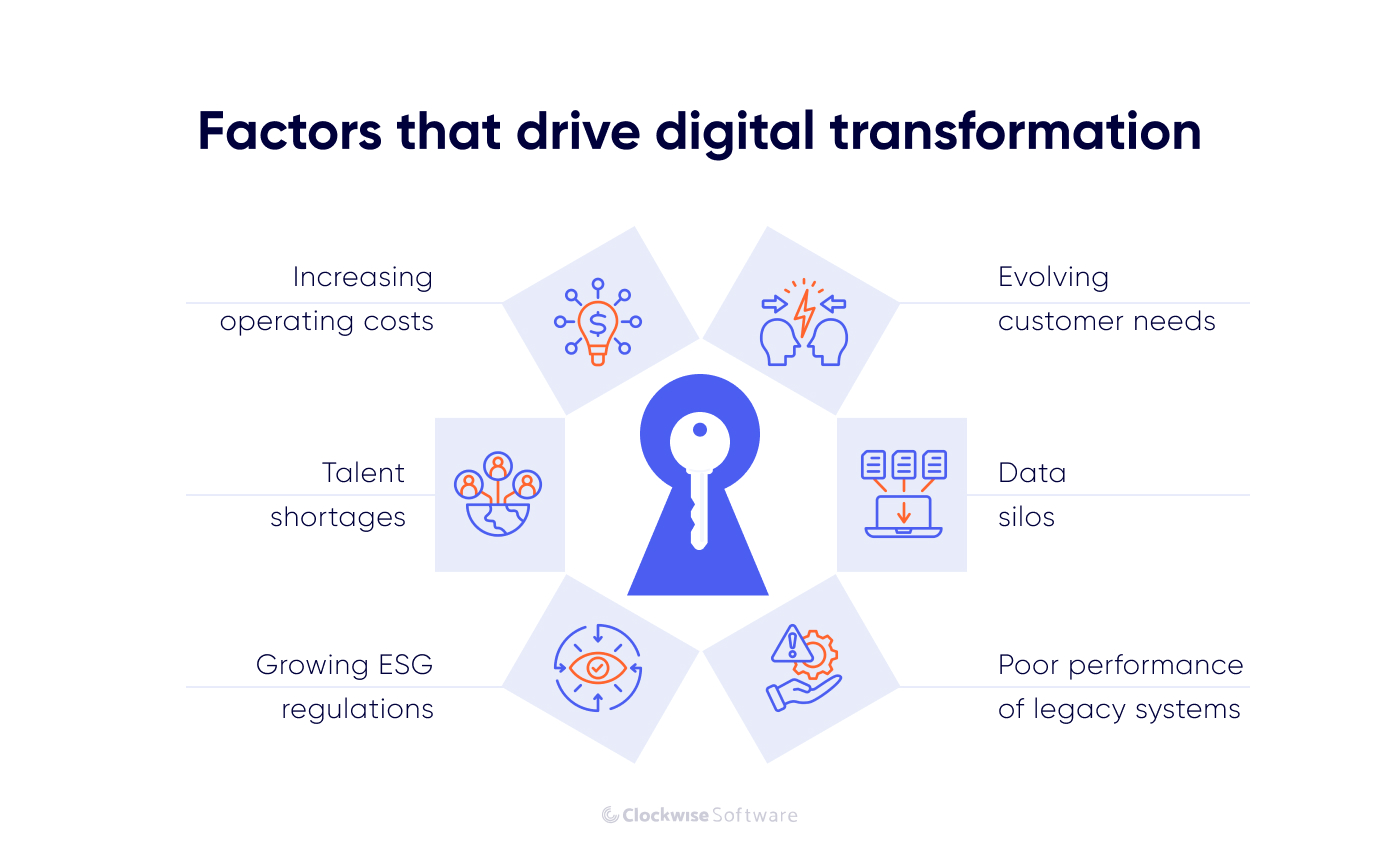
That’s why it’s time to start a new stage of digital transformation in real estate.
Adopting new technologies is a strategic decision that can help you overcome existing challenges in the most efficient way and eliminate problems caused by legacy technologies.
Below, you can discover how digital transformation can contribute to your success.
Digital transformation for real estate is an opportunity to experience positive changes in various areas, from customer relations to operating efficiency and building sustainability. With emerging technologies, you can:
As you can see, digital transformation in real estate is of great value. Technological innovations allow real estate companies to accelerate business growth, create customer-centric services, improve real estate professionals’ productivity, and, as a result, get a competitive advantage in the market.
What modern technologies are capable of bringing these benefits to real estate companies? Let’s see.
Several technologies enable the current digital transformation in the real estate sector: cloud computing, the Internet of Things (IoT), artificial intelligence (AI), augmented and virtual reality (AR/VR), and the blockchain. Recent advancements in these technologies make it possible to effectively use them in business, and many real estate companies have already started adopting them.
What value does each technology bring? Here is a short overview.
Cloud computing services refer to software and other solutions delivered on demand via the internet. Companies use cloud computing services in two ways:
How do cloud computing services benefit real estate companies? This technology enables a new level of business efficiency by giving companies the following advantages:
Migration from on-premises solutions to cloud-based solutions started years ago. According to Statista, 40% of real estate companies in the US have already adopted cloud services. Nowadays, cloud technologies remain an essential part of digital transformation in real estate: 37% of industry leaders name cloud computing as one of the most important technologies for their business in the next five years.
The Internet of Things refers to the network of smart devices that can monitor physical building and environment characteristics and exchange data with other devices and systems.
In real estate, IoT has multiple use cases. Smart devices are powerful tools for managing building sustainability, helping companies collect and monitor data on temperature, energy use, air quality, and other physical characteristics of buildings and associated environments.
IoT devices are also used in security systems, helping to detect suspicious activity, smoke, and other safety and security issues. Overall, this technology contributes to efficient real estate management and improved living conditions.
Many real estate players have already recognized the benefits of IoT devices: more than 70% of businesses use IoT and report that it can help reduce building maintenance costs by up to 30%.
Modern digital transformation in real estate is frequently associated with artificial intelligence — especially with generative AI models that are pre-trained on large amounts of data, can support generative and non-generative tasks, and require less effort and resources to implement than traditional AI.
Generative AI’s meaning for businesses in real estate lies in the opportunity to accelerate internal processes and provide more valuable services. Routine task automation, improved forecasting and decision-making, smart property valuation, personalized customer service, and enhanced property management are just a few examples of AI’s benefits.
Real estate companies are still in the early stages of AI adoption. According to the Commercial Real Estate Outlook 2024 we mentioned earlier, only 14% of real estate companies adopt AI, while 28% of companies are at the start of implementation. However, according to a survey by HLB, 54% of companies say that AI will be one of the most important technologies for their business in the next five years.
Augmented and virtual reality (AR and VR) technologies help real estate companies increase consumer satisfaction and cut marketing expenses. They are mostly used in real estate marketing and sales for virtual staging and home tours. In this way, companies offer prospects a convenient alternative to in-person viewings and, at the same time, save costs on physically staging properties. Additionally, AR and VR can be useful for property inspections and building development management.
Real estate players recognize the benefits AR and VR bring. According to JLL’s Real Estate Technology Survey 2023, about 26% of real estate companies worldwide have already adopted AR/VR viewings, and 64% list it as one of the technologies they plan to adopt in the near future.
A blockchain is a decentralized database mechanism that allows for secure and transparent data storage. Data in blockchain databases is publicly available and can’t be changed. If someone wants to alter a previous record, they need to create a new one that is added to the blockchain in chronological order.
The blockchain’s public availability, decentralization, and immutability make it highly valuable for real estate. Industry players actively use this technology to record property transactions in _smart contracts, _which eliminate the need for an intermediary while guaranteeing the security and transparency of records. According to Deloitte research, 63% of real estate respondents invest in smart contracts.
Another use of the blockchain in real estate is real-world asset (RWA) tokenization. This means that a property ownership record can be tokenized and stored in the blockchain database. RWA tokenization simplifies the buying and selling process, makes real estate transactions more secure and transparent, and allows for fractional ownership of properties.
How can companies use modern technologies to embrace digital transformation in real estate?
The ways are as broad as the processes in the industry. We can see this by the number of diverse proptech tools — digital solutions tailored to the real estate industry — that have appeared on the market in recent years and attracted investors’ attention.
According to the Proptech Global Trends Report, in the 2022–2023 fiscal year, business management software (property management, ERP, CRM systems, etc.) attracted the largest amount of investment ($23.03 billion), followed by big data and analytics tools, construction technologies, and building operating tools.
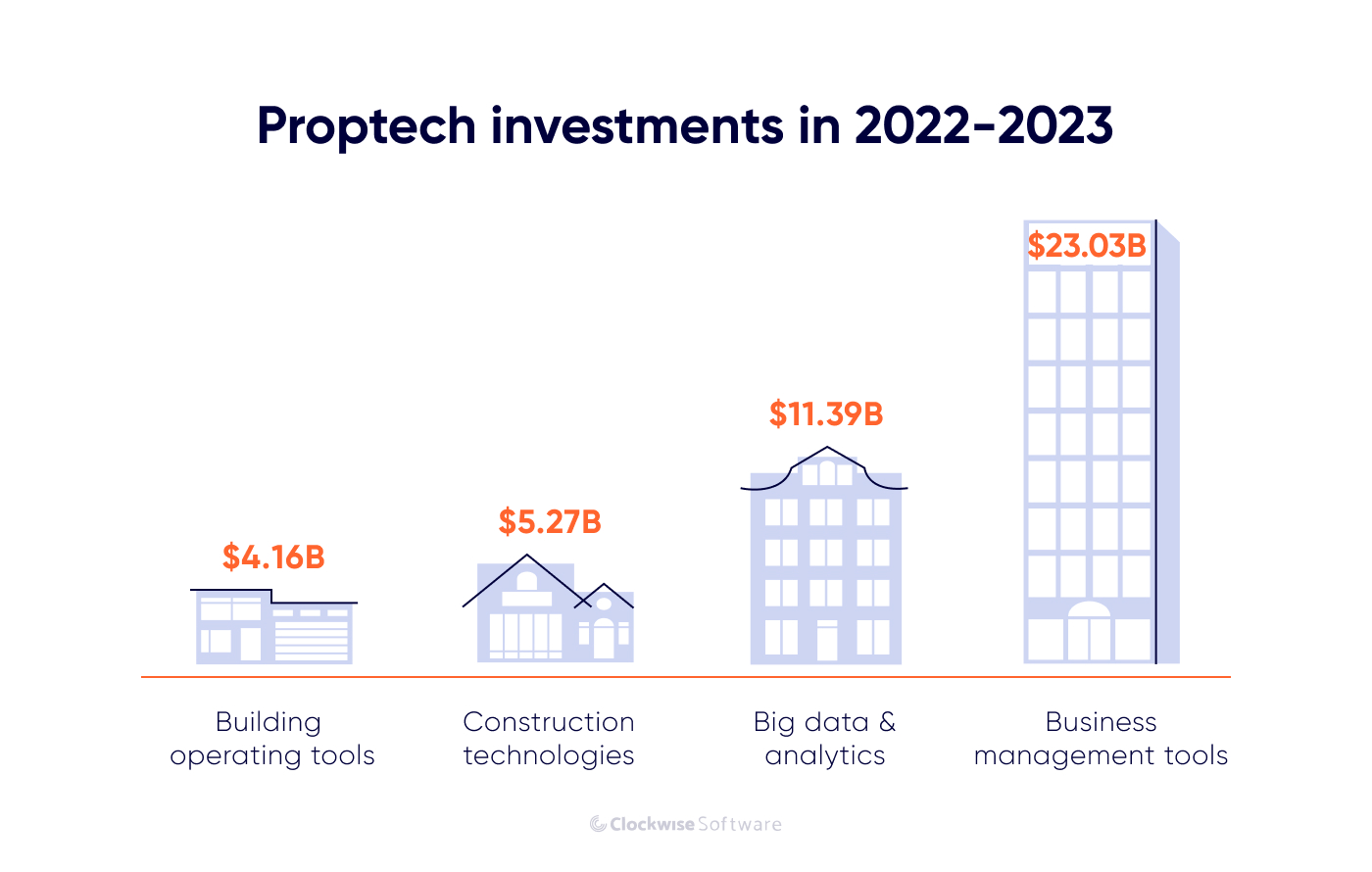
Most proptech solutions leverage emerging technologies, offering more powerful tools to industry players to streamline processes that previously were manual, time-consuming, or ineffective.
At the same time, many companies modernize their existing systems by implementing AI-based components, IoT devices, and other technologies.
Below, we share seven examples of real estate tech solutions and describe how emerging technologies enhance them.
Making real estate investment decisions and closing deals involves a lot of work with data and people. When information is not centralized or accessible to every team member, managing investment deals takes lots of time, and the chance of making a suboptimal decision is high.
Luckily, modern solutions significantly enhance the investment decision-making process and help real estate professionals organize the deal management workflow to operate faster, maximize the value from available data, and close the most profitable deals.
Cloud-based investment deal management software is an important part of digital transformation in commercial real estate. With such software, you can improve the visibility of your entire portfolio, track the progress of deals, compare investment opportunities, and securely store information for every deal.
Additionally, by incorporating AI into such software, you can streamline analytics and reporting — the same as Dealpath did in 2023 to enhance its product with AI-powered search and investment summary features.
Customer relationship management (CRM) software is not a new solution, but it constantly evolves, enabling real estate agents and brokers to operate more effectively.
Most modern CRM systems are cloud-based and support integrations with third-party services such as Zillow and Realtor.com. With such CRMs, real estate agents can access up-to-date information on leads, campaigns, and deals within one platform, easily view or distribute property listings across various third-party websites or multiple listing services, and monitor performance.
With the new stage of digital transformation in real estate, there is a way to make CRM systems even more powerful. For example, by adding AI components, it’s possible to improve data analysis and automate routine tasks such as writing listing descriptions, emails, and social media posts.
This is exactly how Compass, a leading real estate brokerage, uses AI. The company provides agents with a CRM that contains an LLM-based chatbot for writing tasks. Additionally, Compass agents receive smart Likely-to-Sell recommendations made by AI based on numerous parameters that predict what properties have a high likelihood of selling in the next 12 months. Agents report that this feature has helped them to double commission revenue.
Managing space utilization, building access, and security in commercial, industrial, and special-purpose buildings is much easier when all information is accessible within one platform.
Workplace management software solutions help to monitor access to a building, analyze occupancy data, access real-time information on available spaces, book meeting rooms and workplaces, and manage tenants’ requests. In this way, you can significantly improve the visitor, tenant, and employee experience while maintaining security standards.
As companies try to encourage people to return to offices, workplace management software becomes a solution to create a great end-user experience within a building and support a hybrid work model. Workplace management solutions have also attracted the attention of investors in the last few years. For example, Envoy raised $111 million in 2022, and HqO raised $50 million in 2023.
Technologies also transform real estate development, providing new solutions for collaboration and operational efficiency.
For example, by replacing fragmented systems with cloud-based development management software, you can improve communication among architects, contractors, engineers, designers, and investors and overview and manage all projects from one place.
There are some ready-made development management solutions on the market, like Ingenious.build, but you can also choose to create custom software, powering it with AI for project performance analysis and accurate timeline and cost predictions based on real-time data.
By implementing AR/VR technologies, it’s possible to create immersive building visualizations, giving contractors and engineers an opportunity to check how unbuilt structures align with the construction plan, identify potential safety hazards, and adjust the development plan to avoid costly errors. Additionally, you can use AR/VR to present to investors how buildings will look.
Many companies are looking for opportunities to enhance building performance, and smart building systems that consist of IoT devices integrated with software make it possible.
Smart building systems help monitor and adjust energy consumption as well as ensure building safety and excellent tenant experiences. A smart building system tracks heating, ventilation, air conditioning, lighting, and other systems within a building, automatically adjusting them for energy savings and comfortable living conditions. At the same time, you can use software to analyze energy use, assess a building’s sustainability, identify issues, and predict maintenance needs.
It’s possible to create a custom smart building system by installing IoT devices and integrating them with your own software or select an off-the-shelf solution like Bisly.
Property management software enables property managers to oversee multiple properties without having to switch between multiple tools — they can access everything from tenant requests to financial statements in one app.
While basic functionality like lead management, maintenance management, task scheduling, tenant portals, accounting, analytics, and document storage significantly enhance property management, technologies like AI can improve property managers’ efficiency even further.
You can use AI for data analysis, informed decision-making, and reporting. Or, you can enhance the tenant experience by implementing AI-based virtual assistants to provide 24/7 support with minor issues, reminders about rent due dates, and updates on maintenance.

For example, Doorstead, a technology-enabled property management company, uses machine learning for property valuation and market analysis. This allows them to accurately estimate rental income, giving homeowners a better understanding of their property’s profitability up front.
A multiple listing service (MLS) is an essential tool for real estate agents. MLS systems give access to information about properties for sale or lease in particular areas, simplifying search and helping brokers and agents fulfill their clients’ needs faster.
MLSs are usually owned by real estate agent associations or private companies. Most look like databases with simple search functionality.
With emerging technologies, it’s possible to significantly improve MLS systems. For example, when developing MLS software, you can implement AI to streamline search among a vast number of listings and recommend the most suitable properties for specific requests. Using location intelligence and adding location-based features such as maps with geospatial data for each listing is another way to make multiple listing services more interactive and convenient.
The solutions we describe in this article are just a small part of the tools you can use to modernize your business. The options are vast, ranging from complex solutions like ERP systems to more specific tools like rent processing and insurtech solutions.
Despite all the benefits technological innovation brings, digital transformation and real estate have a difficult relationship. Companies in the industry frequently fail to achieve desired results in technology adoption. Why does this happen? Based on the JLL Global Real Estate Technology Survey conducted in 2023, we can name several barriers to success:
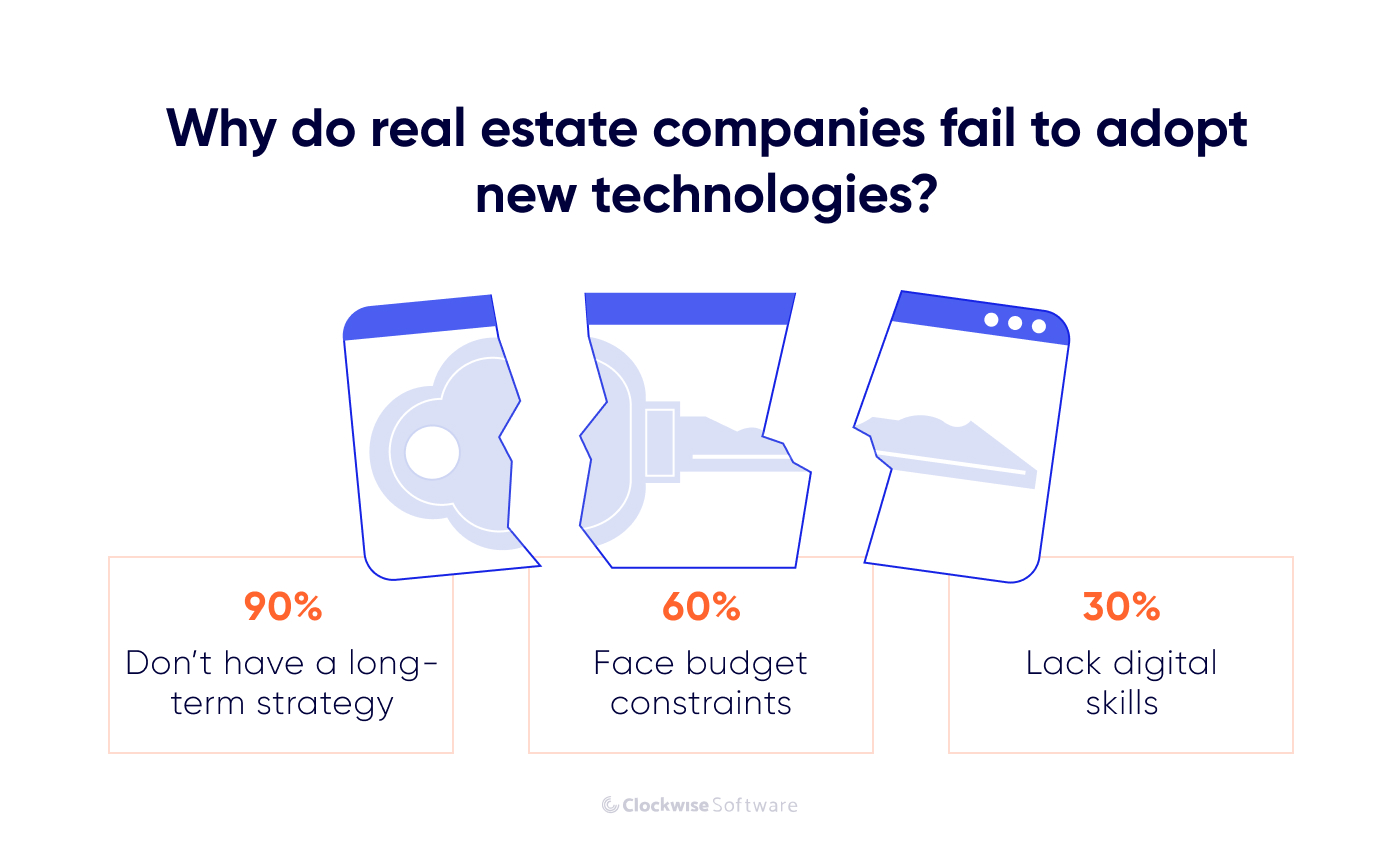
Nearly 90% of companies that are already on their real estate digital transformation journey say they don’t have a long-term strategy. At the same time, over 60% consider their technology programs to be less successful than initially expected.
These two facts are strongly connected, as it’s difficult to navigate changes without setting technology goals, prioritizing actions, defining success measures, evaluating current technologies, and creating a technology development plan.
Additionally, real estate companies, especially small and midsize businesses, usually lack technical teams. Therefore, it may be difficult for them to choose, implement, and maintain the right digital solutions for their business.
Budget constraints
Although 80% of real estate businesses plan to invest in digital transformation, they frequently have budget constraints and are concerned about its cost. This is cited as the top challenge by companies that aren’t satisfied with the results of their existing technology programs.
More than 80% of real estate companies in the US are small businesses with annual sales volumes under $25 million. They can’t invest in technology on the same level as industry leaders. Additionally, they often need to prioritize short-term goals and deprioritize goals like real estate digital transformation. Thus, when a technology implementation project requires an additional budget, companies may not have the funding.
Lack of technology literacy among teams
Lack of digital skills is another challenge on the way to technology adoption. Thirty percent of real estate players identify poor technology literacy as their most significant barrier.
However, the primary cause of this problem is the recruiting approach real estate firms use. According to a Deloitte study, only 4% of job openings in real estate require advanced digital skills, while traditional skills like sales, marketing, and finance are targeted much more frequently.
These are serious barriers, but it’s possible to overcome them. Below, we share our recommendations on how you can prepare for real estate digital transformation and start modernizing your business processes.
The success of digital transformation in real estate depends on how you approach it. Changing the way business operates is not as easy as clicking “update,” but it can have a significant positive impact on your business’s efficiency and profitability.
So, how can you approach digital transformation? We explain the main steps you should take to transform your operations while minimizing risks.
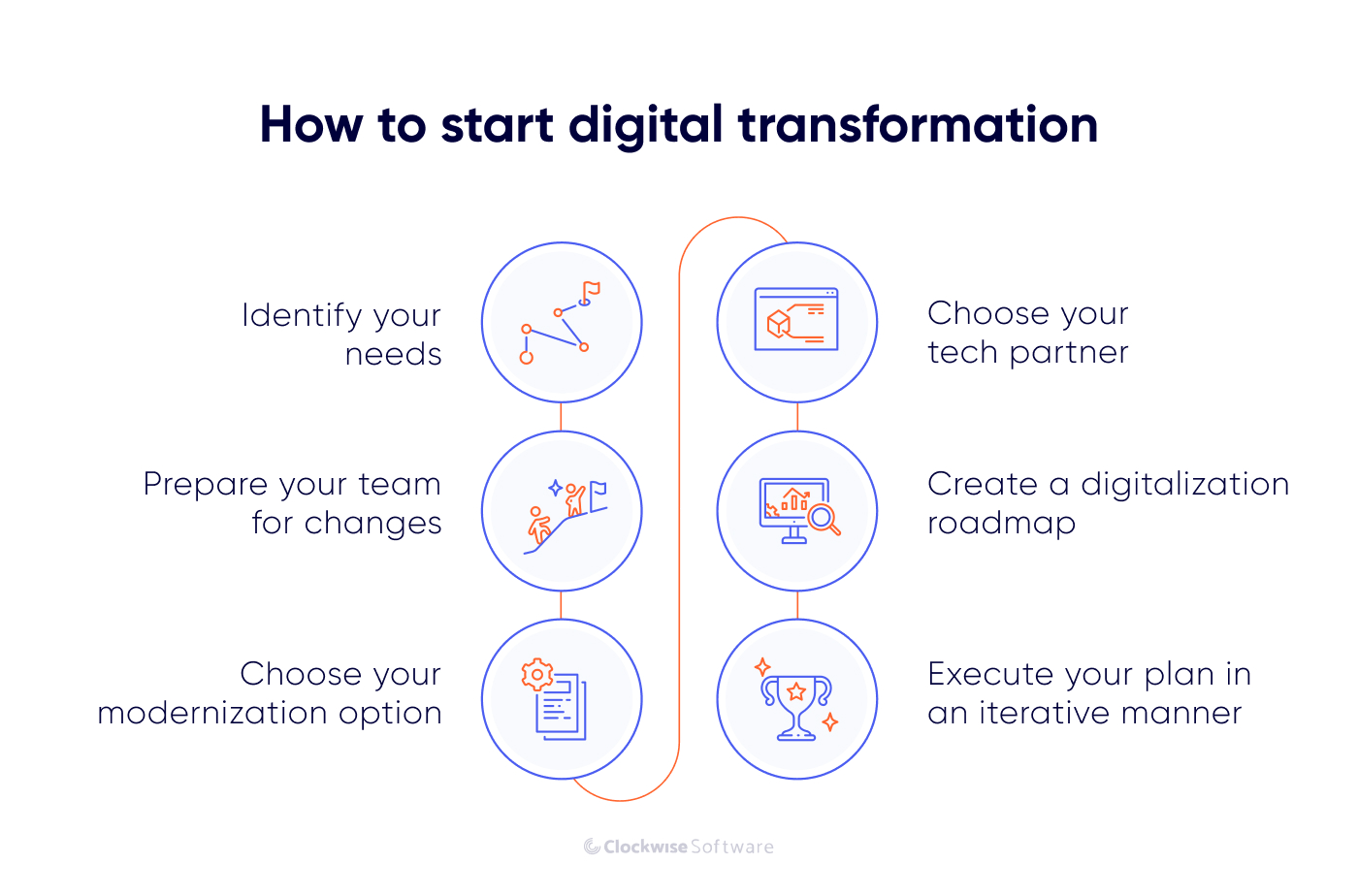
What problems do you want to solve by implementing new technologies?
This question should be your starting point for digital transformation because without understanding the purpose of innovation in your business, you can choose the wrong solutions to implement.
You need to access your existing business processes and identify where your existing software doesn’t provide sufficient value or what processes are still manual and can be optimized with digital solutions. Asking employees about their main workflow challenges is a great way to find areas for improvement.
At this stage, it is also important to consider customer needs. What flaws in your services have customers noticed? What do you lack to meet their expectations?
After analysis, you will have a clear picture of what you need to improve to operate more efficiently, reduce costs, and enhance your services.
People are at the heart of any business, especially in real estate. If you start modernizing your business without explaining to your team why it’s needed, what changes to expect, and how they can prepare for it, your efforts won’t bring positive results.
A well-articulated vision of existing problems and technology’s potential to solve them can greatly support successful real estate digitalization. You also need to encourage your employees to embrace changes, develop new digital skills, and be curious about ways to perform tasks more efficiently.
Once your needs are clear and all stakeholders are aligned towards modernization, it’s time to consider how to implement changes. Let’s look at three different scenarios:
Improve existing systems
Do you find your existing systems good enough and just want to improve them?
If you use custom software, you need to start by assessing your system and its architecture. Depending on assessment results, you can choose to add additional features, integrate third-party solutions, rethink the architecture design, or migrate to the cloud if your software is on-premises. There are enough cases that prove the efficiency of such improvements — just look at AvalonBay, a company that cut hosting costs by 50% and improved scalability by moving to cloud infrastructure.
To assess your existing systems and choose the best way to modernize them, it’s best to use software development consulting services. A team with a skilled business analyst, software engineer, QA specialist, and UI/UX designer can help you decide how to improve your software to meet your business goals.
If you use third-party solutions, you can contact your vendor and ask them to configure your system to match your new demands. However, customization of third-party solutions is limited, so there’s a chance you won’t get the functionality you need to operate efficiently.
Try off-the-shelf solutions
If your business software doesn’t satisfy your needs or even creates errors and decreases productivity, you can consider moving to another software solution with better functionality and performance.
The proptech industry offers many solutions for different needs. You can research available options and try the most suitable one for your business. Most modern solutions are SaaS products offered via a subscription, so if you don’t find a new product valuable, you can easily cancel your subscription.
Even though various ready-made solutions are available on the market, they may not be enough to cover your needs or create value for clients that would distinguish you from competitors. Every business is unique, and ready-made solutions with standardized functionality may not include features that are vital to your business. That’s why many real estate companies prefer to build custom software or use both custom and third-party tools in their operations.
Create custom software
Building custom software is the way to get a solution that covers all your business needs and is fully tailored to your processes.
With custom software, you can add any functionality you need and replicate the workflow you are used to. The only difference is that you won’t need to use multiple unconnected tools anymore. You will have a single platform for everything. If you’re looking for an example of a custom solution, check out our property management software development case study.
On top of that, you can ensure software performance and scalability that match your business needs by choosing the most suitable architecture design, security measures, etc.
Custom software development requires more dedication and upfront investment but usually pays off with significant increases in productivity, efficiency, and customer satisfaction. Real estate companies recognize the opportunities custom solutions bring. According to a JLL report, 72% of surveyed companies invest in developing tailored tools along with using off-the-shelf solutions.
Whether you want to improve your existing systems or create new custom software, you will need a team with technical expertise by your side. There are two possible options for how you can access this expertise:
Gather an in-house team
If you prefer to have full control over the modernization of your business, creating an in-house development team is a great option. But make sure that you know what talents to hire and have time to be involved in every stage of development. Also, keep in mind that in addition to app development costs, you’ll need to allocate a budget for recruiting and onboarding, benefits packages, salaries, and necessary equipment and software.
Outsource software development
Outsourcing is a way for companies without a development team to get a custom product with minimum stress. By partnering with a real estate software development company, you get all development processes covered without needing to worry about recruiting, onboarding, and benefits packages. You pay for a finished product, stay informed about the development progress, and participate in key decision-making, but you don’t need to commit a lot of your time to overseeing project development. This type of partnership lets you free up time to focus on strategic decisions and your business goals.
When looking for a tech partner, it’s best to choose one who has experience building real estate solutions. For example, if you want to build property management software, consider companies that provide property management software development services. They understand industry-specific requirements better and consider them when deciding on architecture and functionality, mitigating many software development risks in advance.
Mapping out how you plan to implement changes and what goals you want to achieve with those changes is essential for successful digital transformation in real estate.
Identify your short-term and long-term milestones and plan implementation phases and timelines for them. If you improve existing systems or build software from scratch, your tech partner can provide you with realistic timelines and advise on priority changes.
You also need to set clear metrics to measure your success. This will allow you to evaluate the impact of implemented changes and promptly adjust your digitalization plan if needed.
The safest and most effective way to embrace real estate digitalization is using an iterative approach. By gradually implementing changes, you have a chance to modernize quickly, evaluate the impact of new tools on your business, and adjust them if needed. In this way, you minimize the risk of negative consequences for your business operations, reduce costs by identifying and eliminating flaws earlier, and make it easier for your team to adopt a new workflow.
An example of an iterative approach is the lean startup methodology that involves developing a minimum viable product (MVP) before full-featured software. This means that you first create software with only the essential features needed to meet your business needs. You test it out, gather user feedback, identify flaws, and iterate, making sure your MVP meets all your requirements. Then you move further, adding new features and repeating the pilot-feedback-refine loop.

It’s important to realize that there’s no definition of done in real estate digital transformation. It is a continuous journey affected by market changes and technological innovations. When new needs arise and your digital tools are no longer sufficient to meet them, you will need to start another loop of digital transformation to ensure business productivity.
How can you make further real estate digitalization easier? Planning and building custom software with flexibility and scalability in mind is a great way to future-proof your solution and make it easy to implement changes when needed.
Digital transformation in real estate is an opportunity for companies to reshape the way they operate, work more productively, make better decisions, and deliver value that exceeds end users’ expectations. Industry players see emerging technologies as a tool to effectively address existing business challenges.
The success of digital transformation strongly depends on how you approach it. We can highlight several key elements you need to succeed in modernizing your business:
If you don’t have an in-house technical team, cooperating with a company that provides real estate software development services is a great way to gain technical expertise. A tech partner can advise you on the most suitable architectural design and functionality that meets your business needs, consider possible risks and create a mitigation plan for them, and help you to plan and execute the entire implementation process.
